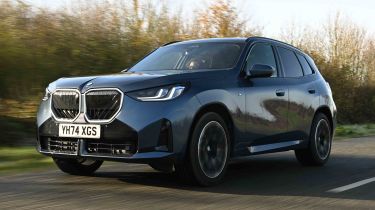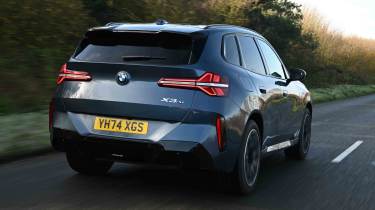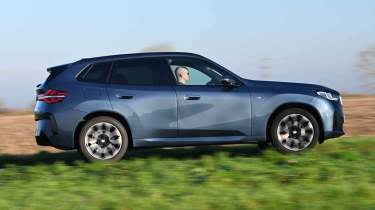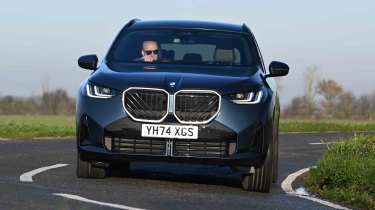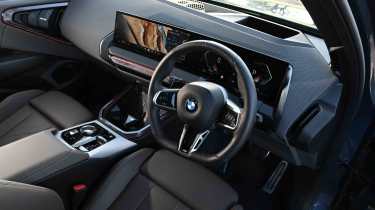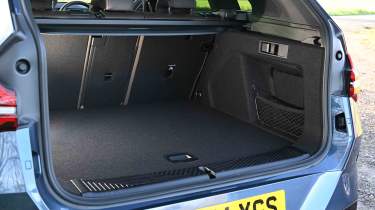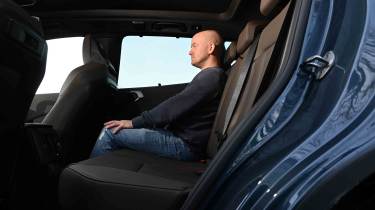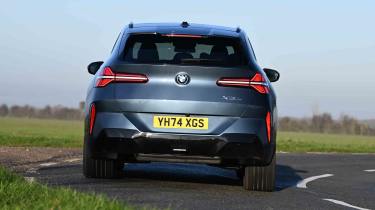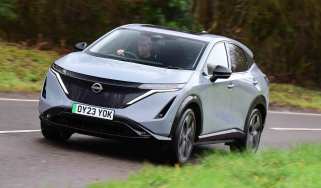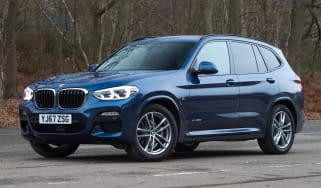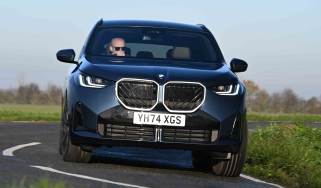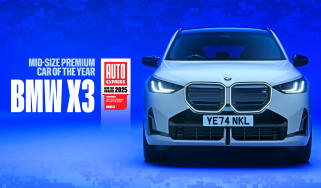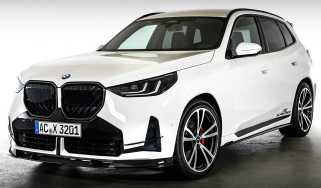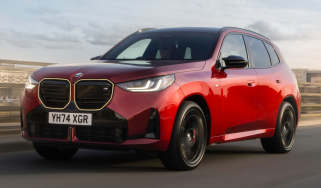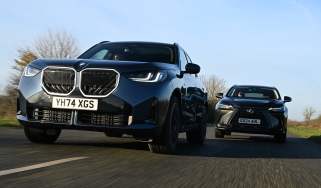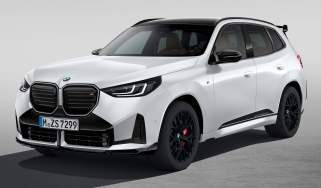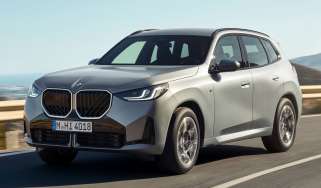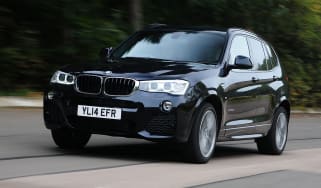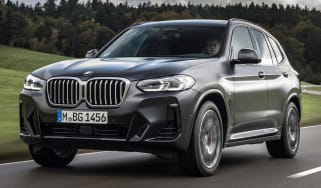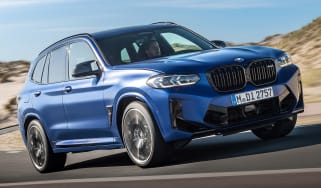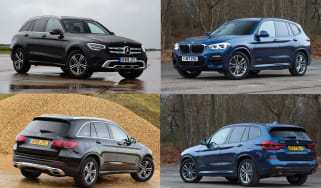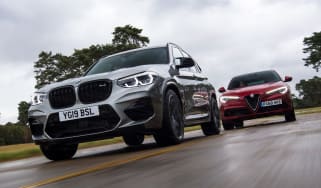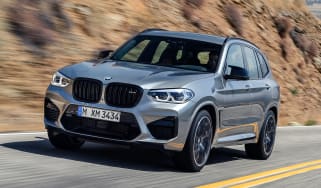BMW X3 review
Fourth generation X3 is our favourite in the premium compact SUV class

Our opinion on the BMW X3
BMW has been building X3s for more than 20 years now, and the constant refinement of the formula to arrive at the fourth-generation model (codenamed G45) is evident in a lot of the current version’s strengths.
In a segment where some cars feel heavy and lumbering, and others feel firm or brittle over bumps, the BMW X3 manages to strike a really impressive balance between the two, and it’s backed up by a series of strong petrol, diesel and plug-in hybrid powertrains.
About the BMW X3
The fourth-generation X3 arrived at the end of 2024, and with it came an evolution in shape, size and powertrains. The latest model is exclusively combustion engined, because the next all-electric iX3 uses a completely different platform.
The X3’s five-door SUV body is larger than its predecessor’s, while power comes from a range of engines that’s carried over from before, but with enhanced performance and efficiency. The line-up kicks off with the petrol xDrive20, while the xDrive20d is the sole diesel option. The xDrive30e uses the same petrol engine as the xDrive20, but adds plug-in hybrid tech, and the xDrive M50 is the performance flagship.
All cars are four-wheel drive and feature an automatic gearbox as standard, while all cars bar the M50 are available in xLine or M Sport trims and with assorted packs that upgrade the X3’s tech and luxuries.
Used - available now
We pitched the X3 head-to-head against the Lexus NX in early 2025, and the BMW took the win, becoming the car to finally knock the NX off the top spot in the mid-size premium SUV class – a title that it had held for three years. Since then, the X3 has also seen off the latest Audi Q5 in another UK twin test to maintain its lead in the class.
BMW X3 prices and latest deals
Prices for the latest BMW X3 are as follows:
- xDrive20 from £48,500
- xDrive20d from £50,000
- xDrive30e from £57,500
- xDrive M50 from £67,000
Upgrading any of these models to M Sport spec adds around £1,800 to the price.
While the X3 is a popular car with buyers, there are still savings to be found via the Auto Express Buy A Car service, where you can save around £6,000 on a new BMW X3.
Engines, performance & drive
Pros |
|
Cons |
|
As a ride and handling compromise, the X3 is very well judged. There are better options for the keen driver in the segment – both the Porsche Macan and Alfa Romeo Stelvio are stand-out choices – but the BMW isn’t far off in bends, while offering more comfort than either of those rivals. One drawback is that the light steering can feel a little unnatural on a twisty road.
Performance, 0-60mph acceleration and top speed
| Model | Power | 0-62mph | Top speed |
| 20 xDrive | 204bhp | 7.8s | 134mph |
| 20d xDrive | 194bhp | 7.7s | 134mph |
| 30e xDrive | 295bhp | 6.2s | 134mph |
| M50 | 393bhp | 4.6s | 155mph |
The previous BMW X3 was the first to be offered with plug-in hybrid tech, and the new 30e moves the game on thanks to a much beefier electrical portion of the powertrain. In contrast to the old model, which at best could muster 107bhp from its electric motor, the 30e xDrive PHEV produces 181bhp. Combined with a 2.0-litre turbocharged petrol engine, there’s a very healthy 295bhp on offer. Usable battery capacity has grown from 12kWh to 19.7kWh, which gives the potential for 56 miles of electric-only driving.
Until the new X3 M arrives, the most potent option in the UK is the M50 xDrive. The 3.0-litre petrol twin-turbo model gets mild-hybrid tech and produces 393bhp. However, the engines that will make the most sense to most buyers are the mild-hybrid 20 petrol (now shorn of its ‘i’ suffix to avoid confusion with BMW’s electric models) and the diesel-powered 20d.
We’ve complimented the petrol X3 on the smoothness of its mild-hybrid set-up in the past, but the diesel’s system isn’t quite as slick. While the petrol version gets a 17bhp motor, the 20d’s 48-volt set-up has 11bhp. That means it’s not quite able to move the X3 away from the line as effortlessly or as smoothly as the petrol unit can before the internal-combustion engine needs to cut in. It’s still smoother than the 48-volt mild hybrid set-up in the Audi Q5, just not as seamless as in the X3 petrol.
Once on the move, the diesel is an excellent engine. It’s smooth and quiet enough that the average driver would be hard pressed to notice it’s a diesel at all, but for the fact that its peak torque of 400Nm makes it very flexible throughout the rev range.
That means the X3’s eight-speed automatic gearbox isn’t desperate to kick down into a lower gear all the time; instead, it’ll try to hold the higher ratio unless you demand a little more urgency. It’s a much more pleasant experience. In manual mode, the gearbox isn’t quite as responsive as the Audi Q5’s unit, but it’s smoother when it’s left to its own devices in auto mode.
Town driving, visibility and parking
Straight away, the X3’s steering showed us how light and responsive it feels on the move. The lack of inertia means that nipping into junctions and twirling the wheel around at parking speeds feels fairly effortless.
M Sport trim brings a slight firmness to the X3’s ride, but there’s still a supple edge overall. It’s more than capable of shrugging off smaller bumps and taking the edge off the potholes that blight British streets.
Country road driving and handling
Despite the tall body and a kerbweight that’s nearly two tonnes (not an unusual figure beside its rivals), the X3 feels tied down in corners. It doesn’t wallow around on its springs, instead remaining impressively level and controlling its mass well. Push those tyres until they begin to lose their grip, and the BMW’s balance stays neutral.
Yet the light steering means that it doesn’t feel like a truly engaging car to drive as BMWs were in the past – even the previous X3 was better in this area. Not only is the steering light, but it’s also short on feedback, a fact not helped by the thick-rimmed and slightly squidgy steering wheels that BMW insists on using.
The BMW X3 M50 comes with uprated brakes (as you’d hope given the increase in engine output) with big, four-piston calipers over similarly impressive discs. While fitting huge brakes to a fairly sensible family car can often result in some grabby characteristics from the pedal, their power is complemented by confidence-inspiring pedal feel.
Motorway driving and long-distance comfort
Cruising refinement is one of the X3’s biggest strengths. Road noise is well isolated from the cabin, and there’s only the slightest bit of wind rustle around the edge of the windscreen. Stability is excellent, and despite that light steering, it doesn’t feel too nervous or darty at high speed.
“Adaptive suspension is optional on all cars except the M50, which gets it as standard. You’ll notice a slightly firm edge to the ride in Sport mode around town, but there’s not a huge amount of difference switching to Comfort. I was happy to leave it in Sport mode most of the time.” - Alastair Crooks, Senior news reporter
MPG & running costs
Pros |
|
Cons |
|
During our time with the BMW X3 20 petrol, we achieved just over 35mpg, although we found that the official WLTP figure of 40.4mpg would be feasible on a motorway run.
In comparison, the diesel proved to be really frugal. Cruising at 70mph on a motorway, the BMW didn’t have much trouble achieving mid-fifties mpg, which is a fantastic effort for a car in this class. Over a mix of urban roads and more open sections, and more enthusiastic driving, the xDrive20d averaged 46.8mpg, which is better than what we achieved in the petrol-hybrid Lexus NX 350h.
While the plug-in hybrid 30e xDrive has the potential to be even more frugal – and is also a little quicker – it costs £5,600 more. That means owners would need to cover significant distances before they recovered the additional initial outlay. Unless you’re selecting a vehicle through a company-car scheme, in which case the plug-in hybrid will become much better value, we’d stick with the diesel.
| Model | MPG | CO2 | Insurance group |
| BMW X3 20 xDrive | 40.9mpg | 156g/km | 32 |
| BMW X3 20d xDrive | 48.7mpg | 153g/km | 33 |
| BMW X3 30e xDrive | 282.5mpg | 22g/km | 38 |
| BMW X3 M50 | 36.7mpg | 175g/km | 42 |
Electric range, battery life and charge time
Major revisions were undertaken to improve the latest BMW X3 plug-in hybrid over the old model. Badged 30e xDrive, the PHEV version now features a 22.3kWh battery – 10kWh more than you got in the previous generation car.
The extra capacity means all-electric range sits at a maximum 56 miles (compared with 29 miles from before). However, that’s behind the latest Audi Q5 e-Hybrid at 62 miles, and both are some way off the Mercedes GLC 300 e’s 80 miles.
Charging times aren’t rapid, either, with a maximum recharge rate of 11kWh from the on-board cable – in contrast, the Audi Q5 can accept a 150kW DC charge. You can expect a 20 to 80 per cent top-up to take around two hours and 15 minutes. In addition to BMW’s three-year, unlimited mileage warranty, the PHEV’s battery is under warranty for up to six years or 60,000 miles.
| Model | Battery size | Range | Insurance group |
| BMW X3 30e xDrive | 22.3kWh | 56 miles | 38 |
Insurance groups
Depending on trim, insurance groups for the X3 range from 32 to 42. The diesel sits one group higher than the petrol, while the PHEV starts in group 38 for xLine trim, but switching from xLine to M Sport spec doesn’t increase the X3’s group rating.
Tax
Vehicle Excise Duty is hefty regardless of which model buyers go for. With all versions costing more than £40,000, they’re subject to the ‘luxury car tax’, which means from years two to six, road tax will cost £620 a year.
The PHEV model makes the most sense to company car drivers. The 30e xLine sits in a far lower BiK (Benefit-in-kind) tax band than either the petrol or diesel cars, so outgoings will be almost half as much as the base petrol model. However, the electric iX3 will offer even greater savings than that.
Depreciation
All versions of the X3 hold their value strongly, with the diesel clinging on to roughly 54-56 per cent of its original price after three years, depending on trim. Unlike the Q5, where the PHEV loses a little more value than the other powertrains, the reverse is the case here; the 30e xDrive is expected to hold on to 55-58 per cent of its value. The sporty M50 loses the largest amount of money in that time, maintaining 52 per cent of its original price.
To get an accurate valuation for a specific model, check out our free car valuation tool...
Interior, design & technology
Pros |
|
Cons |
|
Recent BMWs have delivered pretty much flawless build quality, but standards seem to have slipped slightly in the X3. It’s a shame, because one or two iffy finishes aside, the cabin looks far more modern and feels more special than almost anything else in the class.
Interior and dashboard design
There’s a distinct concept-car feel to the X3’s cabin. The open, gently curving dashboard falls away from the base of the windscreen into the cabin, while a pair of digital displays are angled towards the driver, giving the X3 the feeling of those driver-centric cockpits of BMWs past. Glowing strips highlight sections of the doors, dashboard and around the centre console, while the optional fabric-trimmed dash, which has an almost chainmail-like finish, manages to look both unique and feel expensive at the same time.
Although the latest X3 has lost its predecessor’s physical climate controls, there’s still a large panel of buttons around the iDrive clickwheel, which makes it easy to find specific functions when on the move.
Materials and build quality
For the most part, the X3’s cabin feels solid and well screwed together, which makes the one or two glaring exceptions that are found inside even more jarring.
The door release is surrounded by a piece of plastic that houses the air-vent controls and door locks, and on every X3 we’ve sampled, it feels like it’s only loosely attached to the door. The door releases themselves, while neatly integrated within a curved section of ambient lighting, are finished in a fairly hard, cheap-feeling plastic, too.
Infotainment, sat-nav and stereo
BMW’s latest OS 9 has integrated some features, such as the climate controls, into its software, but we’d have preferred it to just retain physical buttons for this. Yet the system remains among the best on the market.
Excellent graphics, the responsiveness of the screen to touches, the superb loading times, and the general layout of the menus make it very hard to fault. Some BMWs have lost their iDrive clickwheel, but the X3 still has this handy feature – and that’s a good thing.
Standard equipment is fairly strong throughout the range, with the xLine getting an automatic tailgate, keyless entry, LED headlights, wireless smartphone charging, cruise control, plus front and rear parking sensors.
The M Sport version largely adds cosmetic upgrades, which include 19-inch alloy wheels, a sportier steering wheel design, black Alcantara/artificial-leather upholstery, and dark headlining. The suspension is also firmed up slightly over the base model.
“If you don’t think the X3 is quite imposing enough, buyers can make it look a little more distinctive at night, too. The ‘Iconic Glow’ feature, which is standard on the M50 model and optional on the rest of the range, illuminates the borders of the kidney grilles which mainly serves to highlight just how large those vents really are. Even when the lights are not turned on, I’m not sold on the design of the X3’s grilles – the mix of angled lines looks a bit fussy to my eyes.” - Alex Ingram, chief reviewer
Boot space & practicality
Pros |
|
Cons |
|
The X3 is a competent all-rounder when it comes to space. There’s not really one area where it’s outstanding for the class, but as a family car it manages to tick all of the boxes.
Dimensions and size
The fourth-generation X3 is significantly longer than its main rivals, but has a shorter wheelbase than the Mercedes GLC, while boot space is a little behind its Mercedes rival, too.
Dimensions comparison | |||
| Model | BMW X3 | Audi Q5 | Mercedes GLC |
| Length | 4,755mm | 4,717mm | 4,716mm |
| Width | 2,132mm | 2,155mm | 2,075mm |
| Height | 1,660mm | 1,662mm | 1,640mm |
| Wheelbase | 2,865mm | 2,828mm | 2,888mm |
| Boot space | 570-1,700 litres | 520-1,472 litres | 620-1,680 litres |
Seats & passenger space
The high driving position that’s common in all SUVs is helped here by the fact that the dashboard line is fairly low when compared with many of the X3’s rivals. The slim, widescreen displays sit low, too, so the view ahead is better than much of the competition. However, the thick base of the BMW’s A-pillars and large door mirrors can create little blind spots when you are trying to pull out of junctions.
An open area in the centre of the dashboard can house two smartphones ahead of a pair of cup-holders, plus there’s a large covered cubbyhole beneath the central armrest, while the door pockets are shaped to house a large drinks bottle as well. On the downside, the German machine’s glovebox is fairly small.
Against our tape measure, the X3 isn’t absolutely vast in the back – kneeroom is largely similar to that of a BMW 3 Series Touring. However, the SUV’s cabin is a little more open than that of its estate rangemate, with plenty of headroom and a forgiving, comfortable rear bench.
While there’s a hump in the middle of the floor, it’s lower than the equivalent in the Q5, but the seat rails are closer together under the front seats than those in the Audi, so foot space is a little narrower. Fitting a child seat is a doddle, thanks to the spacious rear seat area and Isofix mounting points that are very easy to reach behind hinged, plastic covers.
The optional Comfort Plus Pack adds what BMW calls the Travel and Comfort System, which includes mounting points for passengers’ smartphones on the backs of the front seats, plus additional USB-C ports. The same pack also adds rear sunblinds, adaptive LED headlights, heated rear seats and a Harman Kardon sound system.
Boot space
Although rivals such as the Mercedes GLC have an even larger boot than the X3, few people are going to grumble about the 570 litres the BMW offers. The low sill lip makes it fairly easy to load heavy items on board, and there’s a little netting to the side of the boot to hold smaller items in place. Folding the seats down creates a more level load area than in the Q5, and the 1,700-litre total volume is huge.
Towing
As well as that roomy boot, it’s also possible to carry even more by adding a tow bar. An electrically retractable one, which can be extended at the touch of a button in the boot, is a £1,025 option.
When it comes to powertrains, the diesel is the one to have if you want to haul big weights. Officially, it can handle a braked trailer weighing up to 2.5 tonnes; that’s 100kg more than the petrol engine can manage, while the plug-in hybrid model has a lower towing limit of 2,000kg.
“Cabin storage is acceptable inside, with two cupholders in the centre console and a useful storage box under the armrest. You’ll find two bottle holders in the doors for the front occupants, although a two-litre bottle will be a struggle to fit.” - Alex Ingram, chief reviewer
Reliability & safety
Pros |
|
Cons |
|
Euro NCAP hasn’t subjected the X3 to its safety assessment yet, but the BMW comes with plenty of standard kit, including front-collision and lane-departure warning as standard. Adaptive cruise control with steering assist, and blind-spot warning technology are available as options.
BMW’s customer satisfaction scores have taken a step up in 2025, with the brand’s eighth-place finish overall (out of 31) in the Auto Express Driver Power survey a jump up from its 14th place the year before.
AS with every other new BMW, the X3 gets a three-year, unlimited-mileage warranty, plus three years of breakdown cover, while extended warranties are available at extra cost.
BMW’s ‘Service Inclusive’ plan allows buyers to opt into an inflation-proof service schedule that covers the length of a finance agreement. It’s a little more pricey than the packages offered by some of the firm’s rivals, though, because a three-year plan costs just over £1,000 on the petrol models and closer to £1,500 for the diesel.
Buying and owning
- Best buy: BMW X3 20d xDrive M Sport
The diesel is our engine of choice if you’re a private buyer, although the 30e plug-in hybrid is worth considering if you’re a company user with access to a wallbox to keep the battery charged. M Sport trim has just enough extra design flair to make it our pick over xLine trim
BMW X3 alternatives
The BMW X3’s position in the compact premium SUV market puts it in line with its usual German rivals, the Audi Q5 and Mercedes GLC. Both cars are due to be replaced in the coming months, but they’ll have to be pretty special to have the better of the X3. Another alternative is the petrol-engined Porsche Macan, which offers performance and handling that is a match for the X3’s, although it’s getting a bit old these days.
If you’d prefer a non-German car, then the Lexus NX is a good option that offers plenty of tech and premium kit, but isn’t as sporty to drive as the X3. The Volvo XC60 is another old-stager that’s been updated in 2025 to keep it competitive.
You can no longer buy a new Jaguar F-Pace in the UK, but the platform-sharing Range Rover Velar is still offered, while the Land Rover Discovery Sport is a more family-friendly alternative to the X3.
Frequently Asked Questions
We gave it the Best Medium Premium SUV crown at our 2025 New Car Awards, so you could say that we rate it as a top choice in the category.

